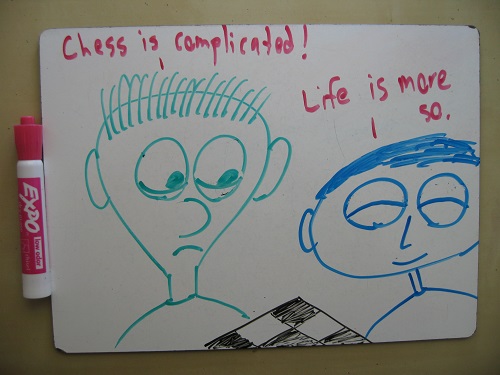Chess was in the air that Friday, as surely as the nitrogen and the oxygen.
Our school’s English teacher, an amateur chess fiend, was locked in a silent grudge match against a student. I was bored, with time to kill between the end of work and meeting a friend at the movies.
I spotted another board lying unused, and thought, Why not? I haven’t played in years.
“Hey, Zhi,” I called to a senior getting an early start on his weekend homework. “You have time for a game of chess?”
He smiled and nodded. “I cannot decline such a formidable challenge.”
That’s how he really talks, bless his heart. In my recommendation letter for his college apps, I described Zhi as “a superhuman student sent to our school from the future.” I stand by it. His diligence is otherworldly. He re-solves every single math problem, over and over, until he understands it completely. I wonder: Does he never encounter the obstacles that hold the rest of us back – the pangs of laziness, self-doubt, mental exhaustion? Or does he feel those things, and simply override them, refusing to negotiate with those base impulses? How does he stay so darn focused?
On his third move of the game, he made a classic novice mistake, positioning a knight uselessly at the edge of the board.
“Try that again,” I told him. “You want to develop your pieces one at a time to control the central squares.”
He nodded, and with panic I realized that he now knew exactly as much about chess as I did.
Twelve moves in, with virtually all the pieces still in play, the entire board loomed like a minefield. Every square seemed to mark a contested battleground. With congestion thwarting the queens, and the pawns forming a frustrating lattice of mutual support, the game reached a zenith of computational complexity. It felt like even Deep Blue might slip up.
“30 pieces in play, spread over 64 squares,” I mused. “You realize the number of possible moves we have to consider each turn?”
Zhi frowned. “Many.”
“‘Many’ is right.”
“No,” Zhi corrected me, “many are wrong. Only a few moves are right.”
And right at this moment – as my student surpassed me not only in chess skills, but in grammatical pedantry and life wisdom – at this moment, I missed my chance. I could have won a knight, but in haste, I overlooked the opportunity, and the piece scampered to safety.
Oh well, I shrugged. Spotting that capture would’ve taken so much… so much… thinking!
Eventually, the trades began, and when the corpses were wheeled away, we stood perfectly even in terms of material, down to the last pawn.
I looked at my watch. Almost time for the movie. I began to blitz through my turns, and bullied a disappointed Zhi into doing the same, but it still wasn’t enough to finish the game. I offered a draw. He accepted.
I dashed out the door, slid on my headphones, sent a few texts, graded a quiz, and had nearly reached the theater before I stopped to reflect on the game. I’m always pushing my students to engage intellectually, to commit to the problem in front of them. But I’d held the game at arm’s length all afternoon. I’d committed my time, but not my attention. Sure, I had more experience and knowledge than Zhi—in a rematch the next week, I’d checkmate him in seven moves—but for that day, Zhi was the better player.
“There’s no question,” I told my friend, finishing the story of our game as the previews began to roll. “I was lucky to pull a draw.”
NOTE: As usual, I’ve used imagination to plug the holes in memory – though Zhi is every bit as classy and distinguished as described. I hope you’re enjoying Grinnell!





My challenge with chess is that I always want to plan my own moves two or three steps ahead. This ONLY works if my opponent is willing to do exactly what I imagine that they will. When they don’t I either have to change my plan (boo!) or I stick with my plan and fall apart.
I run into exactly the same problem. Patience is really half the battle–I need to give my brain reset time to consider how my opponent will see the board once I’ve made my move.
Chess is always a fun endeavor, I often play defense until the opponent makes a mistake which means I don’t have much of another strategy.
Not a bad strategy, against most opponents. My dad says he used to play tennis this way, and actually won a tournament once just by returning shots and not trying to do anything especially clever.
LOL, I think it’s a reflection of my poor understanding rather than an actual strategy, but it’s worked out as well as could be expected when you rely upon someone else to make an error…but it is also why most computer run programs show me the weakness of this strategy since they tend to perform moves with little chance of a magnanimous mistake. Tell your dad congrats for the victory.
really cool story. this kid sounds special, I’m curious what his future holds. also “what to do when your student eclipses you” is something worth thinking about as educators.
He’s a great kid. I’ve been lucky to teach lots of great kids, but Zhi always hung around for hours after school, so I’ve got extra stories about him.
That’s a good question you point out–how do support students in learning things we ourselves don’t know or can’t yet do.
I love what you guys are up too. This type of clever work and
exposure! Keep up the great works guys I’ve added you guys to my blogroll.